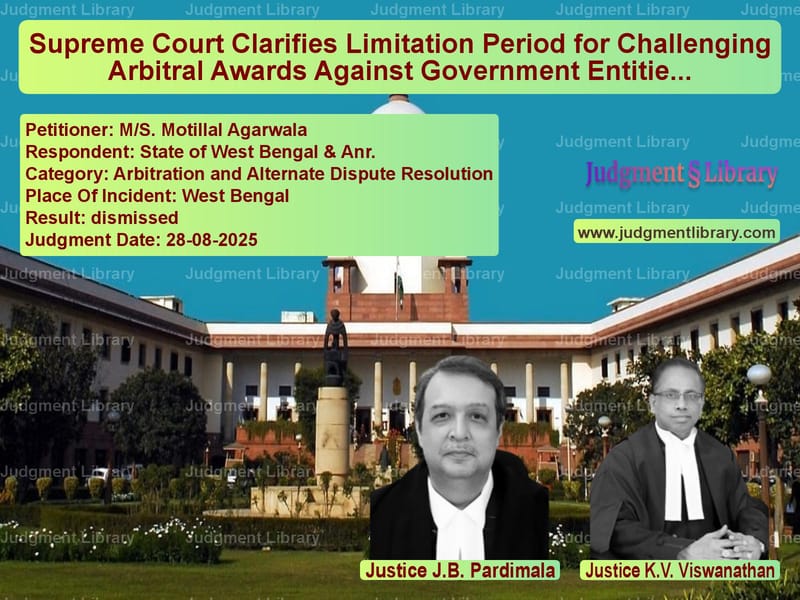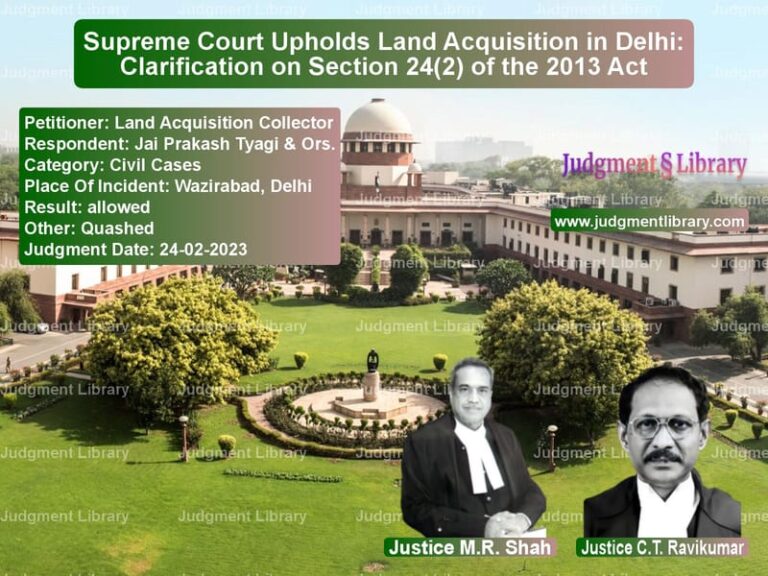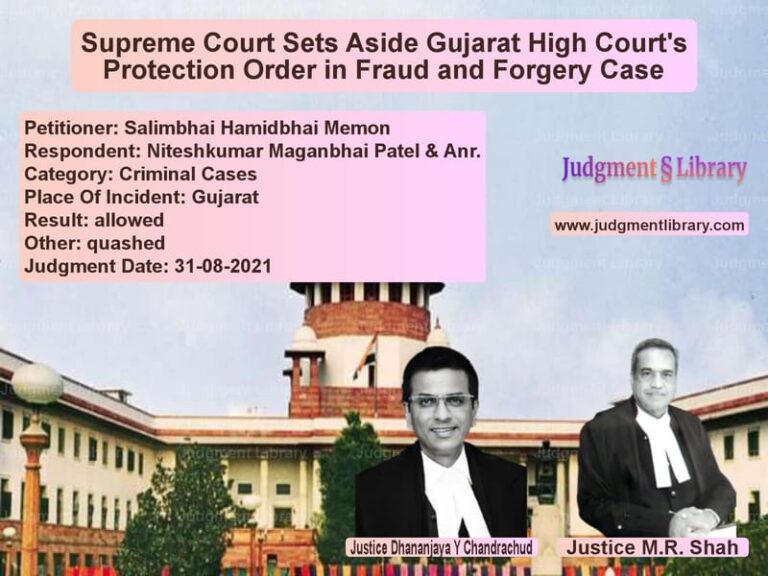Supreme Court Clarifies Limitation Period for Challenging Arbitral Awards Against Government Entities
In a significant ruling that clarifies the crucial question of when the limitation period begins for challenging arbitral awards against government entities, the Supreme Court has delivered a landmark judgment that balances technical legal requirements with practical administrative realities. The case, which involved a dispute between M/s. Motillal Agarwala and the State of West Bengal, addresses the fundamental issue of what constitutes proper service of an arbitral award on government departments and when the clock starts ticking for filing challenges under the Arbitration and Conciliation Act, 1996. The Court’s decision emphasizes that service of arbitral awards on government entities must be made to officers with decision-making authority, not just any representative who participated in the arbitration proceedings.
The Background of the Arbitration Dispute
The legal battle began with an arbitral award dated November 12, 2013, passed in favor of M/s. Motillal Agarwala against the State of West Bengal. The State, having suffered an adverse award, sought to challenge it by filing an application under Section 34 of the Arbitration and Conciliation Act, 1996. The crucial question was whether this application was filed within the prescribed limitation period of 90 days. The facts revealed that an authorized representative of the State had collected a signed xerox copy of the award on the very day it was passed – November 12, 2013. However, the State claimed it had no knowledge of the award until the appellant initiated execution proceedings. It was only then that the State immediately filed its Section 34 application on March 20, 2014, and subsequently requested a certified copy from the arbitrator on April 3, 2014.
The Conflicting Decisions in Lower Courts
The District Court took a strict view of the limitation period, holding that the Section 34 application was time-barred since the State’s authorized representative had received the award on November 12, 2013. According to this calculation, the limitation period expired on February 12, 2014, making the March 20, 2014 filing clearly out of time. However, the Calcutta High Court took a different approach. The High Court allowed the State’s appeal, setting aside the District Court’s order and holding that the application was not time-barred. The High Court reasoned that the award had not been properly served on the Secretary of the Irrigation and Waterways Department or the Executive Engineer, who were the actual parties to the arbitration agreement. The authorized representative who collected the award, according to the High Court, did not qualify as a ‘party’ under the Act.
The Supreme Court Hearing
Before the Supreme Court, Mr. Ajit Kumar Sinha, the learned Senior Counsel appearing for the appellant, vehemently argued that the High Court had committed an error. His principal argument was that “the authorised representative, who actually participated in the arbitral proceedings and was in complete knowledge of every fact of the proceedings, had collected the xerox copy of the award duly signed by the Arbitrator and in such circumstances, it could be said that the State had the knowledge of passing of such award on 12.11.2013.” He contended that “this Court may take the view that the authorised representative in full knowledge of the entire litigation would fall within the expression ‘party’, as defined under the Act 1996.”
On the other side, Ms. Madhumita Bhattacharjee, the learned counsel appearing for the State, defended the High Court’s decision. She fairly admitted that “the State is unable to run away from the fact that the authorised representative had collected the xerox copy of the arbitral award, duly signed by the Arbitrator, on 12.11.2013 but unfortunately the authorised representative never brought it to the notice of the State that such award had been passed.” She argued that “the authorised representative of the State would not fall within the ambit of ‘party’, as defined under the Act 1996.”
The Supreme Court’s Legal Analysis
The Supreme Court, comprising Justices J.B. Pardimala and K.V. Viswanathan, conducted a thorough analysis of the relevant provisions of the Arbitration and Conciliation Act, 1996. The Court examined Section 34(3), which prescribes a three-month limitation period for setting aside arbitral awards, and Section 31(5), which requires that a signed copy of the award be delivered to each party. The crucial question was whether delivery to an authorized representative constituted delivery to the ‘party’ as defined in Section 2(1)(h) of the Act.
The Court placed significant reliance on its earlier decision in Union of India vs. Tecco Trichy Engineers & Contractors (2005), which had established important principles regarding service of arbitral awards on government entities. The Court reproduced and emphasized the crucial observations from Tecco Trichy: “The delivery of an arbitral award under sub-section (5) of Section 31 is not a matter of mere formality. It is a matter of substance. The delivery by the Arbitral Tribunal and receipt by the party sets in motion several periods of limitation such as an application for correction and interpretation of an award within 30 days under Section 33(1), an application for making an additional award under Section 33(4) and an application for setting aside an award under Section 34(3) and so on.”
Defining ‘Party’ in Government Context
The Court provided crucial clarity on who constitutes a ‘party’ in the context of government departments. Quoting from Tecco Trichy, the judgment explained: “In the context of a huge organisation like the Railways, the copy of the award has to be received by the person who has knowledge of the proceedings and who would be the best person to understand and appreciate the arbitral award and also to take a decision in the matter of moving an application under sub-section (1) or (5) of Section 33 or under sub-section (1) of Section 34.”
The Court further elaborated that “in large organisations like the Railways, ‘party’ as referred to in Section 2(h) read with Section 34(3) of the Act has to be construed to be a person directly connected with and involved in the proceedings and who is in control of the proceedings before the arbitrator.” In the present case, the Court found that only the Secretary of the Irrigation and Waterways Department or the Executive Engineer qualified as parties, not the Assistant Engineer who had collected the award.
The Court’s Final Ruling
The Supreme Court unanimously dismissed the appeal, upholding the High Court’s decision. The Court held that “the authorised representative in this case would not fall within the ambit of ‘party’ as defined by Clause (h) of Sub-Section (1) of Section 2 of the Act 1996 to an arbitration agreement.” The Court emphasized that “the delivery of the copy of award has the effect of conferring certain rights on the party as also bringing to an end the right to exercise those rights on expiry of the prescribed period of limitation which would be calculated from that date.”
Recognizing the practical realities of government functioning, the Court observed that “the authorised representative of the State could not have taken the final decision to challenge the award. It is only the Secretary of the concerned Department or the Executive Engineer, who could be said to be the competent authority to take a decision as to whether the award could be challenged or not.”
Broader Implications and Directions
The Supreme Court’s judgment has significant implications for arbitration practice involving government entities. It establishes that proper service of arbitral awards must be made to officers with decision-making authority, not just any representative who participated in the proceedings. This recognition of the hierarchical and departmentalized nature of government administration ensures that limitation periods don’t start running until the relevant decision-makers are actually aware of the award.
Noting that the litigation was already 12 years old, the Court issued a directive for expeditious disposal of the case, requesting “the District Court to take up the appeal of the State and see to it that the same is decided on its own merit within a period of six months from the date of receipt of a copy of this order.” This direction reflects the Court’s concern about delays in arbitration-related litigation and its commitment to ensuring timely resolution of disputes.
The judgment represents a careful balancing act between strict adherence to limitation periods and recognition of administrative realities in government functioning. By requiring service on officers with actual decision-making authority, the Court has ensured that government entities get a fair opportunity to challenge arbitral awards while maintaining the integrity of the arbitration process. The decision provides much-needed clarity for arbitrators, parties, and courts dealing with similar issues and reinforces the principle that technicalities should not override substantive justice in arbitration matters.
Petitioner Name: M/S. Motillal Agarwala.Respondent Name: State of West Bengal & Anr..Judgment By: Justice J.B. Pardimala, Justice K.V. Viswanathan.Place Of Incident: West Bengal.Judgment Date: 28-08-2025.Result: dismissed.
Don’t miss out on the full details! Download the complete judgment in PDF format below and gain valuable insights instantly!
Download Judgment: ms.-motillal-agarwa-vs-state-of-west-bengal-supreme-court-of-india-judgment-dated-28-08-2025.pdf
Directly Download Judgment: Directly download this Judgment
See all petitions in Arbitration Awards
See all petitions in Enforcement of Awards
See all petitions in Commercial Arbitration
See all petitions in Contract Disputes
See all petitions in Judgment by J.B. Pardiwala
See all petitions in Judgment by K.V. Viswanathan
See all petitions in dismissed
See all petitions in supreme court of India judgments August 2025
See all petitions in 2025 judgments
See all posts in Arbitration and Alternate Dispute Resolution Category
See all allowed petitions in Arbitration and Alternate Dispute Resolution Category
See all Dismissed petitions in Arbitration and Alternate Dispute Resolution Category
See all partially allowed petitions in Arbitration and Alternate Dispute Resolution Category







